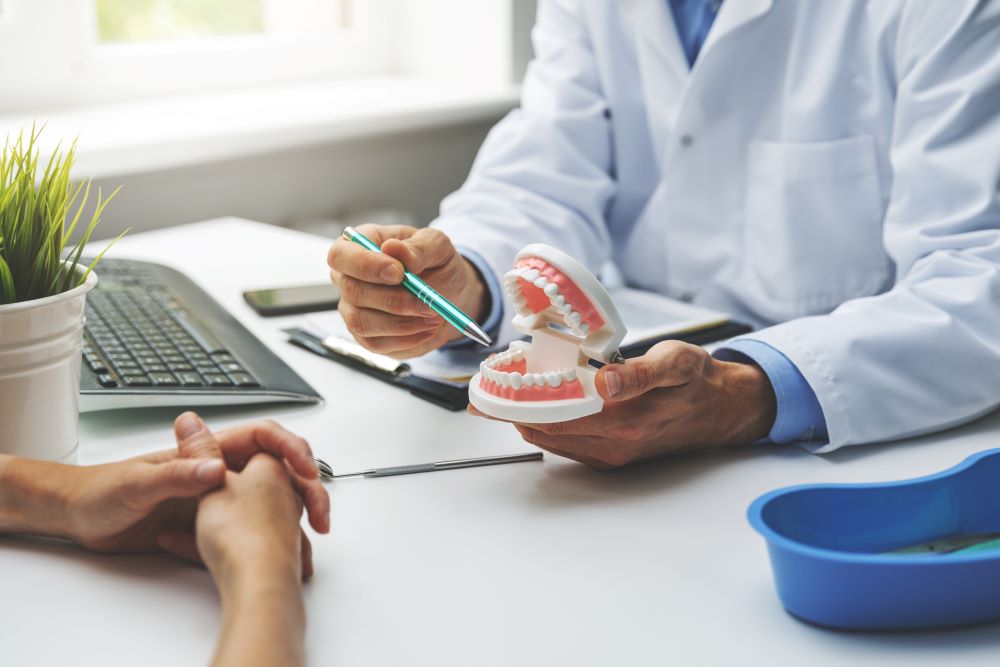Dental implants are an excellent option to replace missing teeth, providing a strong and lasting smile and ensuring your long-term oral health. However, a lot goes into the treatment process, which can worry some patients. You should ask your dentist some questions during your initial consultation to address any concerns.
Are Dental Implants Right for Me?
Dental implants are a versatile treatment option, but they aren’t necessarily right for everyone. First, you should ask your dentist whether dental implants are right for your case.
Your dentist will thoroughly evaluate to determine whether dental implants are the right tooth replacement option for you. They’ll use X-rays and other techniques to assess your jaw and any remaining teeth to ensure you’re a good candidate for dental implants.
In some cases, your dentist may recommend alternatives to dental implants. A conventional dental crown could be the best treatment option if a decayed or damaged tooth hasn’t been lost yet. If you have conditions that make dental implant placement a poor choice, your dentist may suggest options such as bridges or dentures.
Am I Going to Need Preliminary Procedures?
Dental implant placement is an oral surgery where the implant itself is placed. However, that may not be the only procedure you need during your treatment. When you talk with your dentist, they’ll let you know if you may need other procedures ahead of your dental implant placement.
If replacing a decayed or damaged tooth still in your mouth, you’ll need extraction before dental implant placement. Depending on your specific case, this could be done during the same appointment as the dental implant surgery or earlier.
Some patients may have deteriorated or thin jawbones that aren’t able to provide proper support for dental implants. In many cases, bone grafting can augment the jawbone to allow for implant placement. This will mean another procedure and additional recovery time during the treatment process.
What Should I Expect During My Procedure?
Dental implant surgery is a relatively straightforward oral surgery. Your experience may vary depending on your specific case, such as if you need tooth extraction at the same time. You’ll receive either local anesthetic or other types of sedation to remain comfortable throughout the procedure.
You may need one or more dental implants at the same time, depending on how many teeth you’re replacing. A single-tooth replacement takes just one dental implant, while implant-supported dentures typically require four implants for each row of teeth. This leads to a longer procedure but can still typically be completed in one visit.
Before the procedure, the placement of the dental implants is carefully planned to ensure proper alignment. Special tools are used to ensure the correct placement to avoid any issues down the line. A hole is drilled for each implant, which is then inserted using their screw-like bases.
You’ll come back for another visit after the implants are fully healed. At this point, the custom dental crown or implant-supported dentures are attached to the implants. The gap between the two visits allows the implants to integrate with the jawbone, providing a strong and lasting foundation.
What Will Recovery Be Like?
While recovery is generally mild, dental implant placement is still a type of surgery. You will have specific instructions to follow during recovery and may experience some symptoms.
Swelling and soreness around the implant site are normal. Your dentist may recommend over-the-counter painkillers during your recovery.
You’ll have to stick with soft foods a few days to a week after the surgery. After that, you may want to avoid chewing in the implant area a bit longer. Keeping up with oral hygiene is essential to prevent infection. Your dentist will provide thorough instructions on how to care for your dental implants during recovery.
All of your symptoms should fade within two weeks. However, that doesn’t mean the healing process is complete. It takes roughly four months for the implants to integrate with the jawbone. However, you won’t notice anything or have to do anything different during that time.
See if Dental Implants Are Right for You
If you have missing teeth, dental implants could be the perfect solution to restore your smile and ensure lasting oral health. You can visit Dr. Brett Langston at Dental Implant & Aesthetic Specialists for a consultation to find out more about your options. Schedule your appointment to find the solution for your smile today.

